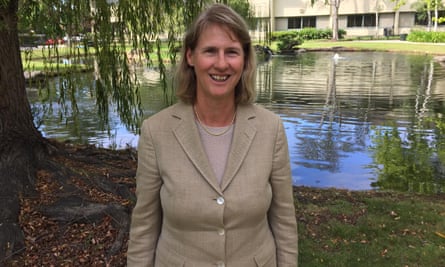Bonnie Crater believes she’s been lucky. As a woman in technology, she has enjoyed a 20-year career that began at Oracle and has led to her current position as CEO of Full Circle CRM, a startup that provides marketing performance applications to businesses and is backed by Salesforce Ventures.
Crater was one of only five women vice presidents at Oracle back when the company had about 4,000 employees. Now she’s one of the few women leading a tech startup.
“I’ve had wonderful managers encouraging me who appreciated my skill set,” she says.
Not every woman is as fortunate, especially in the male dominated tech industry. So Crater has made an unusual public pledge: whenever her company has an opening for a senior leadership position, she or her colleagues will interview at least two women for the job. Crater is challenging other tech business leaders and venture capital firms to do the same.
“If you have diversity in leadership you will get diversity in your company,” she says. Right now, Full Circle CRM’s staff is 45% female and its board is 66% female. A number of studies have shown that diverse teams are more productive and innovative than a homogeneous group.
Crater’s approach to the diversity issue may sound familiar to professional football fans. The pledge, she explains, was inspired by her friend Patricia Murray, a veteran of Intel who worked for years in human resources. Murray was concerned about the lack of diversity at Intel and, without much of an example to follow in Silicon Valley, Murray looked to the National Football League for guidance.
There, she discovered the Rooney Rule. More than a decade ago, despite the fact that most NFL players were African American, only 6% of head coaches were black. In 2003, the Rooney Rule, named for Pittsburgh Steelers owner and chairman of the league’s diversity committee Dan Rooney, required that teams interview at least one minority candidate for every open head coach and general manager position. Soon, the number of black coaches rose to 22%.
Murray suggested a similar approach at Intel, and Renee James, Intel’s president, confirms that the company has put it in place. “Intel’s intent is to always have at least one diverse candidate on the list for every hire made,” James says. “More is better, but we must have at least one, and that is the direction we give to every hiring manager in the company.”
Intel recently announced a goal to achieve full representation of women and under-represented minorities in the US by the year 2020. More work remains to be done: the company’s workforce is just 24% female, 8% Hispanic, and 3.5% African American.

The Rooney Rule appeals to some because it applies to interviewing rather than hiring. It’s not the same as quotas, which many countries have enacted to raise the number of women in politics and on corporate boards, according to Darren Rosenblum, a law professor at Pace Law School. “A quota to mandate diversity in the pool for a position raises fewer questions than an actual quota because it solely mandates consideration of a more diverse pool, not the appointment of a sex-balanced cohort of individuals,” Rosenblum says.
Lauren Tucker, the CEO of Cooler Heads Intelligence, a marketing consultancy, says she doesn’t think that quotas or mandates are a productive way to increase diversity. “As an African American woman with 25 years in marketing intelligence and data analytics, I’ll admit I may have benefited from one of these well-meaning programs,” Tucker says. She emphasizes the word “may” because she says it’s hard to assess the impact of the programs throughout a career.
Tucker says she has heard the claim that there aren’t enough qualified female or minority employees all too often, and she doesn’t buy it. Managers in male-dominated fields are afraid, she says: “The fear arises from their visceral belief that hiring anyone that doesn’t look like them is a risk. This leads to the mission to find the ‘perfect’ female or minority candidate – a mission that is not only futile, but also assumes that majority candidates are either perfect or their flaws don’t count.”
Another advocate for a more creative approach to diversity is Pooja Sankar. At 34, Sankar beat the tech industry’s diversity odds by landing positions at Oracle and Facebook before founding Piazza, a social learning and recruiting platform, that has 45% representation of women and minorities among its employees.
Sankar says companies should dedicate specific teams, with a separate hiring track, focused on sourcing and hiring diverse candidates. “Diverse candidates often don’t have the social networks in place to give them the inside scoop on how to prepare for case interviews or coding interviews,” Sankar explains. She suggests that the diversity team can reduce the intimidation factor by ensuring that female and minority candidates have exposure to women or minorities who are current employees.
It’s fitting that Crater would borrow an idea from the NFL. She credits a lifetime of competitive sports – rowing and sailing at Princeton, speed skating, polo and tennis as an adult – to her fearlessness in the workplace. Research has shown that many women won’t even apply for a position unless they feel 100% qualified.
Crater says expanding the applicant pool does not mean companies should lower their standards. “I’m not asking companies to hire anyone but the very best candidate,” she says.
Instead, her goal is to give women a chance to demonstrate what they can do. “I have every confidence that if women get a fair shot, they’ll make the most of it.”

Comments (…)
Sign in or create your Guardian account to join the discussion